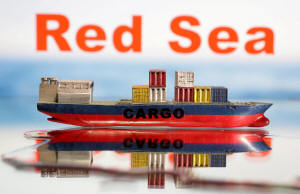|
Currently around 200,000 containers are being transported via
the Red Sea daily, down from some 500,000 per day in November,
the IfW Kiel institute said.
Diversions in response to the attacks have led to journeys
between Asian production centres and European consumers taking
up to 20 days longer, said Julian Hinz, director of the IfW
Kiel's trade policy research centre.
"This is also reflected in the declining trade figures for
Germany and the EU, as transported goods are now still at sea
and have not already been unloaded in the harbours as planned,"
Hinz said in a statement.
Shipping giants such as Maersk and Hapag-Lloyd have been sending
their vessels on longer, more expensive journeys around South
Africa's Cape of Good Hope.
Iranian-backed Houthi militants in Yemen have stepped up attacks
on vessels in the Gulf region in recent months to show their
support for Palestinian Islamist group Hamas fighting Israel in
Gaza.
By region, the IfW Kiel's trade indicator for December showed
exports from and imports to the European union down by 2% and
3.1%, respectively. The United States saw a 1.5% drop in exports
and a 1% drop in imports, although the Red Sea trade route is
less crucial for that country.
China's trade bucked the trend, with exports up 1.3% and imports
up 3.1%. The institute said this was likely down to the upcoming
Chinese New Year.
(Reporting by René WagnerWriting by Rachel MoreEditing by Mark
Potter)
[© 2023 Thomson Reuters. All rights
reserved.]
This material may not be published,
broadcast, rewritten or redistributed.
Thompson Reuters is solely responsible for this content.

|
|




